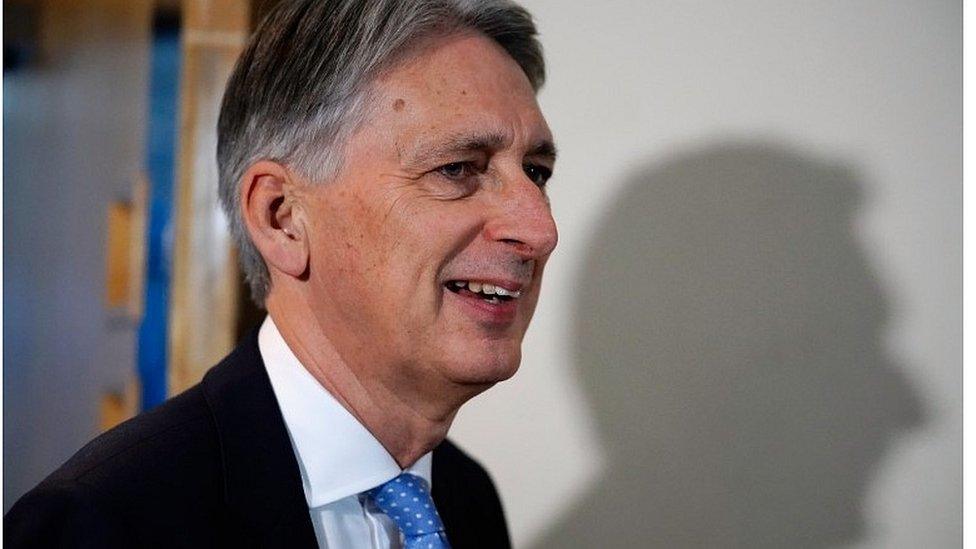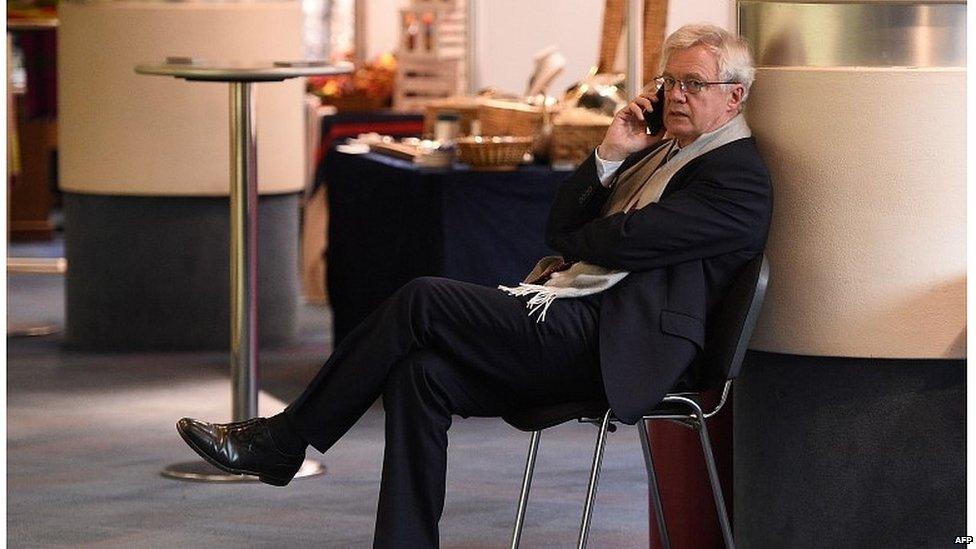Brexit: Hammond's 'no risk' stance caused problems, says David Davis
- Published

Mr Hammond wants a business-friendly Brexit
Philip Hammond's "no risk" approach to Brexit is causing problems for Theresa May, an ex-colleague has said.
Former Brexit Secretary David Davis told the BBC's Political Thinking podcast the chancellor was among those advising the prime minister "we can't take that risk and don't do that".
Mr Hammond has said no-one voted for Brexit to end up worse-off.
Meanwhile, leading Brexiteer Liam Fox has said getting MPs' support is vital and any deal can be "revised" later.
The UK is due to leave the EU on 29 March 2019. The negotiations have entered a crucial phase, with the two sides hoping to reach an agreement by the middle of November at the latest.
With the clock ticking, Mr Fox, the international trade secretary, has warned colleagues to focus on getting an agreement that can command the support of Parliament, where Mrs May has a slim majority and has already suffered several defeats over Brexit.
He and Mr Hammond are supporting the PM's Chequers plan for a free trade zone for goods, underpinned by a common rule book, unlike Mr Davis and Brexiteers outside government who say the plan should be ditched in favour of Canada-style free trade deal.

David Davis is opposing the PM's plans
The chancellor is seen by Brexiteers as being too cautious and too ready to believe leading businesses' concerns about the economic impact of the UK leaving the EU without a deal and Treasury forecasts about the negative effect on economic growth and the public finances.
Mr Davis, who quit the cabinet in July in protest at the direction of Brexit policy, suggested that despite being an "old mate of mine", Mr Hammond was acting as a brake on the chances of getting the best possible deal.
Mr Davis told the BBC's Nick Robinson that the chancellor had been among ministers saying "we can't take this risk; we can't take that risk" which, he suggested, had made things more difficult for him, as a negotiator.
"Philip's an old mate of mine. But the truth is that you've got several ministers, not just him, in the background, issuing noises saying 'we don't mean this'. Well we bloody do!'".
'Purist position'
However, on a trip to South Korea, Mr Fox said the "reality" facing all those who believed in Brexit was that any deal had to get through the Commons, where the PM relies on the Democratic Unionists for her majority.
"While I may be very sympathetic with those who take an ideologically purist position, we are also politicians whose job it is to deliver," he told Bloomberg, external.
What Mr Hammond had to say on Brexit at the Conservative conference
"We must leave and we must leave on 29 March - not to deliver Brexit is the greatest political risk we could run.
"We should try and get as much of a final deal as we can get by 29 March but it is self-evident that if it is a bilateral treaty, it can be revised later on."
Brexiteers are divided on whether an imperfect deal can be improved after the UK's departure.
Environment Secretary Michael Gove has suggested it can be modified later, but former foreign secretary Boris Johnson has said this is "pie in the sky".
Ahead of the next summit of EU leaders later this month, the main sticking point to an agreement remains finding a solution to the issue of avoiding a hard border between Northern Ireland and the Republic of Ireland.
Both sides are under pressure to modify their so-called "backstop" proposals to prevent the return of physical checks at the border while protecting the EU's single market and the UK's internal market.
You can listen to the Political Thinking podcast with Nick Robinson